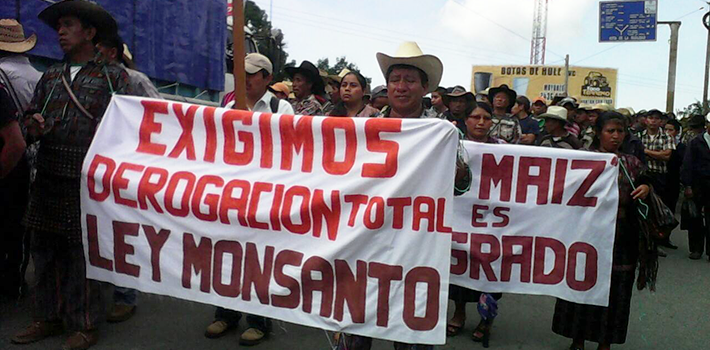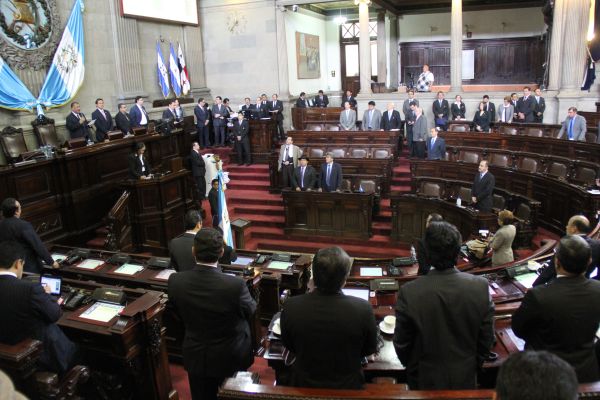
EspañolThe Guatemalan Congress has moved to repeal the country’s contentious “Monsanto Law,” meant to protect new plant varieties. The decision came on Thursday, September 4, after heavy pressure from environmental and agricultural organizations.
The legislation was originally passed three months ago, and was designed to protect intellectual property rights regarding new varieties of vegetable seed. Civil society organizations and activists immediately spoke out against the law, arguing it placed the interests of major corporations ahead of individual liberties.
On September 1, 120,000 Guatemalans held a march in opposition to the so-called Monsanto Law, demanding that Congress act. Of the 158 deputies in Congress, 117 voted in favor of repealing Decree 19-2014, signed into law by President Otto Pérez Molina, and originally scheduled to take effect on September 26.
In addition to indigenous organizations, other civil society groups marched in support of the law’s repeal, including the National Network for the Protection of Biodiversity, the College of Agricultural Engineering, San Carlos University of Guatemala, The Agrarian Platform, and the University of Rafael Landívar.
“According to this law, the rights of the seed producer take priority over the right of the people’s free use of the seeds…. It is a direct attack on ancestral knowledge, on biodiversity, on life, on culture, on the economy, on the worldview of the people, and on food sovereignty,” read a statement from the Alliance for the Protection of Biodiversity.
Product of Free Trade Agreements
The Law for the Protection of New Plant and Varieties was dubbed the “Monsanto Law,” because it would have given companies like Monsanto, Bayer, and Dupont “strict property rights in the event of possession or exchange of original or harvested seeds of protected varieties without the breeder’s authorization.”
Vecinos de Patzún exigen que se publique derogación de Ley Monsanto. http://t.co/4UDMeAHhi7 pic.twitter.com/jgMrsBAxgl
— Roberto Morales (@rmorales_mu) September 7, 2014
According to a statement issued by the National Network for the Defence of Food Sovereignty in Guatemala (REDSAG), the law “grants patents to individuals and national or international legalities of any member country of the International Union for the Protection of New Plant Varieties (UPOV) that are able to appropriate the tangible and intangible genetic heritage of the country…”
In an interview with Voxxi, UPOV representative Antonio González warned that the proposed legislation, “risks biodiversity, native seed varieties that are over 7,000 years old and that never required patents or labs, but have been able to sustain the lives of the Guatemalan people.”
Under the law, any newly modified or genetically altered tree or vine seed variety would have been patented and protected for 25 years, and other types of vegetables for 20 years.
Article 50 stated that violators would be punished with “four years in prison and a fine of GUA$1,000-10,000 (US$130-1,300) for those that produce material of a protected variety … without proper authorization; those that trade material of a protected variety with knowledge that it was obtained in violation of the rights of the title holder; and those that contract the transportation of the material of a protected variety outside the authorization of the present law without the approval of the title holder.”
Article 16 established exceptions to patent violation penalties for experimental cases or “private, non-commercial acts.”
The law’s enactment was part of the 2005 Free Trade Agreement (TLC) between Central American nations, the Dominican Republic, and the United States.
Monsanto’s Response

On Monday, Monsato issued a statement rejecting the notion that the company has been the principal promoter of the legislation. They say it was the Republic of Guatemala that, in 2006, applied for acceptance to the International Convention for the Protection of New Varieties of Plants (UPOV), and then approved the subsequent legislation.
“We have always respected the independence of the legislative process of the Congress of the Republic of Guatemala,” the statement read.
The multinational corporation has had legal issues in a number of countries in the past, including Argentina, Colombia, Chile, Canada, and Brazil.
In Chile, a similar law was presented in Congress, only to be withdrawn by the Michelle Bachelet administration earlier this year. In 2013, a group of Brazilian agricultural workers reached a settlement with Monsanto after suing the company for charging royalties for the use Monsanto seeds.
Protectionism in Disguise?
Stephan Kinsella, a US lawyer who specializes in intellectual property rights, says the case is a demonstration of “US imperialism.”
“I’m not in favor of intellectual property or the Monsanto situation,” he told the PanAm Post.
“This is an example of why so-called ‘free trade’ agreements — both bilateral and multilateral, including treaties like ACTA and the TPP — almost always sneak in protectionist measures, like US intellectual property standards, for the benefit of American companies like Monsanto, Hollywood, the music industry, the pharmaceutical industry, etc.”
“Patent and copyright law should both be abolished, and should not be agreed to by other countries,” Kinsella added. “They should resist the US pressure. Exit these agreements and treaties.”
 Versión Español
Versión Español












